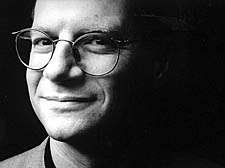| |

Professor Jonathan Wolff |
The top Professor who failed his exams
Professor Jonathan Wolff failed his
A-levels and found himself in a boring job. He tells Jane Wild the importance of studying when you are ready
AS Head of Philosophy at University College London, you might expect Professor Jonathan Wolff to have left sixth form with a wad of A-grade certificates.
But the day he received his results he was in for a less-than-pleasant surprise.
Awarded an A for economics, but an O-level pass in history and an F for English, the death-knell had sounded for his hopes of reading law at university that year.
So what went wrong, and how did someone who seemed so unsuited to study end up in one of the top academic posts in the country?
Mr Wolff says: “I think the main fault was that I chose unsuitable topics.
“I let teachers persuade me to do inappropriate topics; I should have done maths instead of English.”
But it wasn’t just the wrong decisions that were to blame.
Like many students he had been studiously occupied with subjects that he wouldn’t be sitting any exams in.
“When I was at the school premises I spent my time playing bridge; I was in the school team,” Mr Wolff says.
“We won the London schools bridge league, which we believed was the only time a comprehensive school had ever won.”
It didn’t stop with card games either. “In free periods I would go to cafés and pubs and play on fruit machines, play table football and at lunchtimes I’d play darts with the postmen.”
A lack of enthusiasm was the final nail in the coffin for his studies.
“Part of the problem was that I was not ready to learn things off by heart or to read in the quantity I had to,” Mr Wolff says.
“Before I started my A-levels I was an avid reader.
“As soon as I started A-levels I stopped reading. I felt that if I was reading I should be reading my text books, and, as I couldn’t bear reading those, I just stopped reading.”
University ambitions shelved, he departed school for a post as clerical assistant in the legal department of insurance company Prudential.
By the third year he was being released one day per week to study law at what is now Westminster Kingsway college.
He says: “Work was so boring. No thought was going into it.
“The most interesting thing that happened was if it was someone’s birthday and we all went to the pub at lunchtime for three hours.
“I realised I enjoyed that one day at college a lot more than the rest of the week.”
Conversations with his teacher led to the conclusion that philosophy was what really suited him, as it was that side of law he was most interested in.
Now very ready to study, Mr Wolff went off to read philosophy at University College London.
He says: “It was just the right thing for me at the time.
“I fell in with a group of people who understood the privilege of going to university, people who had worked in boring jobs and were tired of what they were doing.
“I worked harder than ever before. It was very stimulating – your views were respected and engaged with.”
Going to university after a spell in the world of work made it an experience all the more valued.
“I think what I learned was not to take university for granted” Mr Wolff says. “I was studying in a department with some of the world’s leading scholars.
“It was an incredible privilege to study with them, whereas some of the 18-year-olds just treated them like they were their teachers at school.”
He graduated with a first then got a scholarship to do postgraduate work in the same department.
Now, twenty years later he is head of the department, and has advice for anyone leaving college believing it has all gone irretrievably wrong.
He says: “You might feel like opportunities are going and time’s slipping by, but it isn’t really. There are normally lots of ways to get back into the system.
“Re-examine what it is that you want to do, take time to think about it, and don’t assume you made the right choice the first time round.” |
 |
| |
|
|


